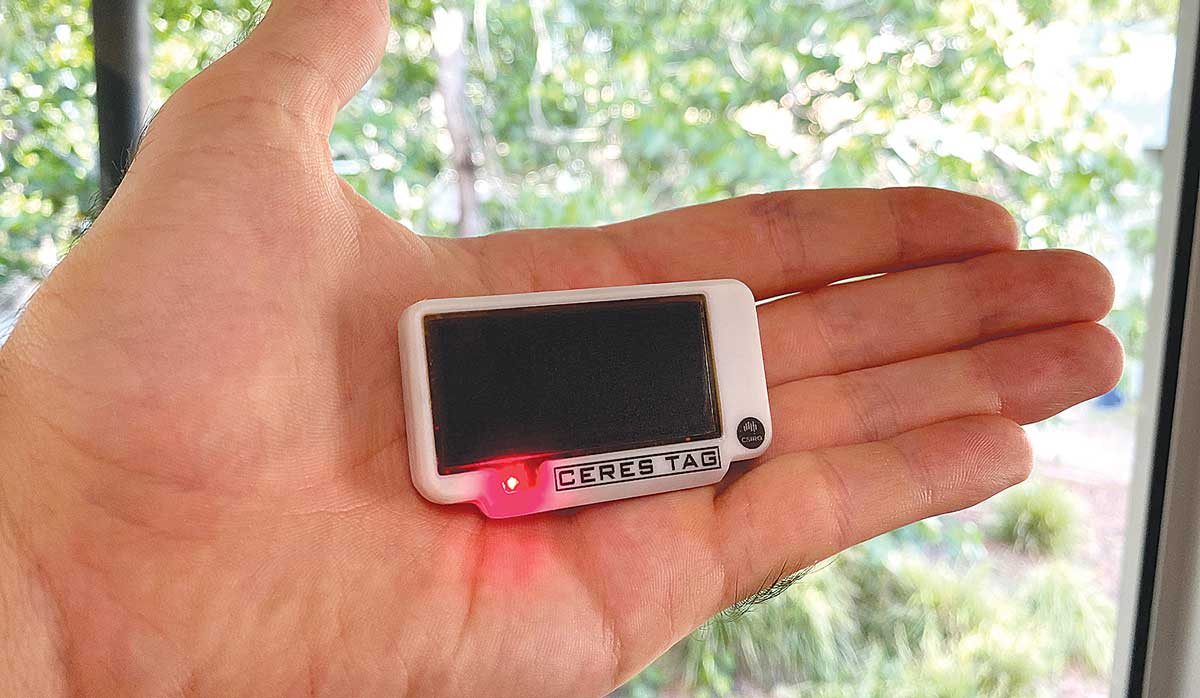Halter goes global, but NZ farmers remain core to innovation
Virtual fencing company Halter is going global but for founder Craig Piggott, New Zealand farmers will always remain their main partners.
The financial, operational and managerial benefits of Ceres Tag ear tags are significant, according to Kenneth Irons, managing director at Precision Farming.
For more than a decade, farmers have been able to rely on accurate electronic data for a wide range of information relating to their farm’s land and infrastructure.
For example, Aquaflex have been producing soil moisture tapes that provide farmers with accurate soil moisture temperature readings, on which they can make fact-based irrigation decisions.
Siemens manufactures flow meters that are robust & accurate, enabling farmers to use fact-based data to manage their water usage, adhere to consents, and detect leaks.
More recently, Levno has been one of the firms installing milk vat monitors on Fonterra farms, providing farmers and Fonterra with accurate, real-time information to help ensure milk quality.
For years, Precision Farming has been aggregating these types of data with the data it generates for farmers, including its GPS Proof of Application nutrient data from fertiliser, effluent, whey, and other applications.
All this land and infrastructure information is sensor-originated, meaning the data is generated electronically. Which in turn means that when those data are provided to farmers in Precision Farming’s system on laptop, smartphone or tablet, it gives information to the farmer reliable data that was not already to hand from observation, or from paper or manual records.
Compare this with the general state of animal data. Stock counts for herds, body condition scores for diary cows, live weights for lambs, NAIT records for cattle sold to the neighbour, ear tags read by hand-held readers – these all involve the farmer creating the data.
In many cases, farmers then upload this information into a farm management platform by typing the details in, or uploading a spreadsheet. These types of websites are for saving information the farmer already knows. So they are recording systems, rather than information systems.
With recording systems, farmers give information to the farm management platform. With information systems, the farm management platform gives information to the farmer. The Precision Farming platform is an information system.
However, largely speaking, information has been about land and infrastructure, rather than about animals.
This is about to change, and change significantly. While electronic data can be generated about animals, it is often expensive per animal, involves significant investment in on-farm readers and hardware, and works only when the animal is brought into close proximity to those readers.
Now, with the imminent arrival of affordable, electronic, solar-powered, satellite ear tags, the same value, accuracy and convenience farmers have enjoyed from land-based data systems will now be able to be derived from cows and cattle.
 |
|---|
|
The ear tag by Ceres Tag. |
This innovation has two major benefits.
Firstly, the ear tags, by Ceres Tag, generate electronic data automatically.
Information collected about animals by hand, whether by wands, or race or shed counters, is always labour intensive, often incomplete, notoriously inaccurate, and usually late.
Electronic data, by comparison, is sensor-originated and so does not require labour, is reliably complete, highly accurate, and near real-time.
Second, the financial, operational and managerial benefits are significant.
Now that land and infrastructure data will be able to be combined in the same computer software as animal data, as data builds up, Precision Farming’s farm information system will be able to analyse cause and effect.
By aggregating data about soil, pasture measurement, fertiliser applications, irrigation scheduling, weather and more, with information about cows and cattle - their GPS location, their wellbeing, their temperature, their feeding and rumination behaviours, cows’ heat, and their body weight and milk production - farmers will be able to gain insights to help improve production, reduce input costs and optimise profitability, while also helping with compliance and sustainability.
Over time, as data volumes build up both within each farm, and across benchmark groups, algorithms will enable better supply chain provenance, improved early disease detection, and broad improvements in herd management.
There are other benefits which involve stock transporters and meat companies. With real-time electronic data coming from cows and cattle, complying with NAIT becomes significantly easier for farmers, cartage contractors and meat companies.
Because the ear tags communicate directly with satellites, animals do not need to come in close proximity to readers in dairy sheds or cattle yards.
Being solar-powered and with a battery life in excess of ten years, more than the average dairy cow or beef animal, the Ceres Tag is like a unique number plate – one tag, one animal. Recyclable, but not reusable. That also provides security against cattle rustling and stock theft. Authorities can see the GPS location of cattle that may have been stolen. Even wandering stock that have broken through fences can be relocated and returned to their rightful owner.
As Yogi Berra, the famous American baseball player was quoted as saying, “the future ain’t what it used to be”.
• Kenneth Irons is managing director at Precision Farming.
Voting has started for the renewal of DairyNZ's milksolids levy.
The most successful catchment groups in NZ are those that have 'a source to sea' approach.
Associate Agriculture Minister and Manawatu dairy farmer Andrew Hoggard says the free trade agreement (FTA) negotiated with India is not a bad deal and his party, Act, will support it when it goes before Parliament.
Newly released data from Environment Canterbury (ECan) Farm Environment Plan (FEP) audits are showing a dramatic lift in environmental performance across the region.
A solid recovery of global dairy prices this year makes a $9.50/kgMS milk price almost a shoo-in for this season.
As New Zealand marks the United Nations’ International Year of the Woman Farmer 2026 (IYWF 2026), industry leaders are challenging the misconception that women only support farming.